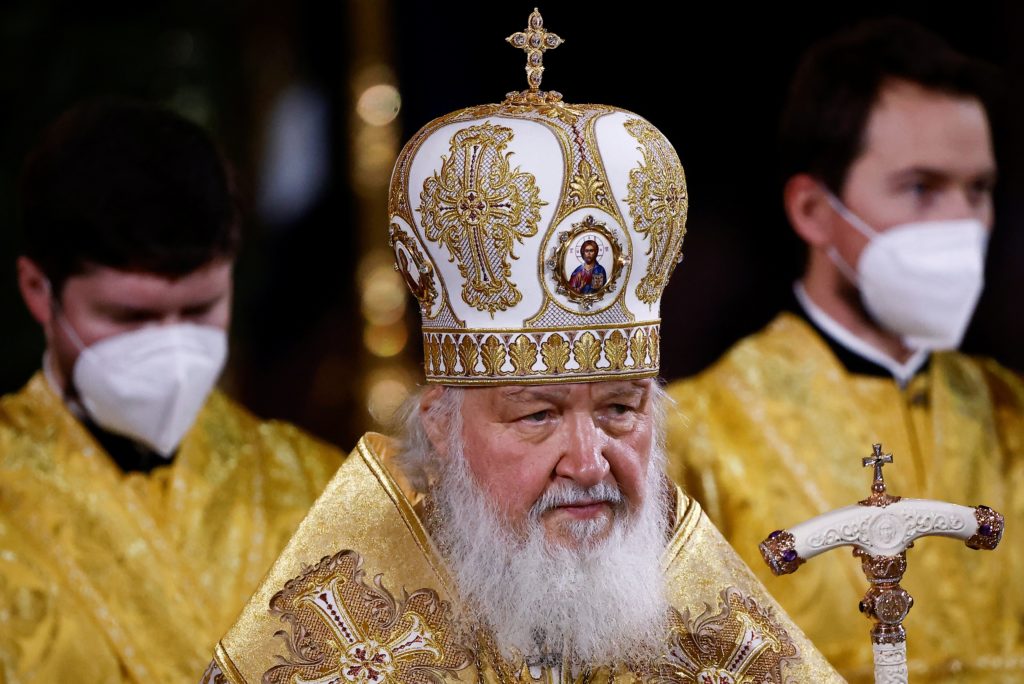On Tuesday, Russian Orthodox Patriarch Kirill of Moscow delivered a homily in which he firmly denied that Russia has launched an attack against anyone, despite its ongoing conflict with neighboring Ukraine, saying it has merely defended its borders.
“We don’t want to fight with anyone. Russia has never attacked anyone, it has only defended its borders. It’s surprising when a great and powerful country did not attack anyone; it has only been defending its borders,” Kirill said in his homily.
The sermon was delivered during a liturgy in the Archangel Cathedral of the Moscow Kremlin on Radonitsa, or the “Day of Rejoicing,” which is the ninth day after Easter and the day on which Orthodox Christians commemorate their dead.
Kirill asked the saints buried inside the Archangel Cathedral to protect Russia’s “sacred borders,” and prayed that Russians would have the “wisdom, strength and honor, if necessary, to defend the sacred borders of the fatherland.”
Since Russia’s Feb. 24 invasion of Ukraine, the conflict has been styled as a “special military operation” by Russian President Vladimir Putin, and by Kirill, who has defended Putin’s position and justified the subsequent war as a defense against a mounting security threat from the West.
In early remarks, Kirill alleged that a growing western “Russophobia” has prompted organizations such as the North Atlantic Treaty Organization (NATO), which Ukraine has sought to enter, to expand their reach and bolster their strength in a specific bid to weaken Russia.
He has also characterized the conflict as a holy war of sorts being waged against a rising wave of Western secularism, saying in a March 6 sermon that the violation of “God’s law” justified the war and cited Ukraine’s acceptance of gay pride parades as an example.
While the exact number of casualties is difficult to ascertain, the war has so far forced around 11 million people from their homes since fighting began. Roughly 5.3 million have fled to neighboring countries, while an estimated 6.5 million are internally displaced, according to the International Organization for Migration (IOM).
Despite mounting pressure from the international Christian community and the splintering of the Orthodox community as a result of his support for the war, with many fearing that outright schism is imminent, Kirill has not backed down from his position but appears to have redoubled his justification for the conflict with Ukraine, which has claimed thousands of lives.
His unrelenting support of the war has also ruffled feathers inside the Vatican, with top diplomats voicing increasing subtle, albeit indirect, criticisms which have made a second meeting between himself and Pope Francis, as well as a potential papal visit to Kyiv, increasingly unlikely.
In a recent interview, Vatican Secretary of State Italian Cardinal Pietro Parolin issued an apparent rebuke of Kirill’s claims that the defense of Christian values is enough to make the war with Ukraine defensible, saying the growth of secularism is worrying, but “the way of countering this phenomenon on the part of Christians can never be violent, and still less armed.”
He also touched on the decision to cancel a planned second meeting between Pope Francis and Kirill over the summer, saying it was being prepared, but was canceled “because it could have created a lot of confusion,” and that “until the current situation experiences positive developments, it will remain suspended.”
Regarding a potential papal visit to Kyiv – which Pope Francis himself on his return flight from Malta said was “on the table” – Parolin said the pope is willing and ready to go, but there would have to be the possibility of “a real improvement of the situation in the country” for the visit to be considered.
“A trip would make no sense if, the next day, the war resumed as before,” he said.
With bombs continuing to drop despite several pleas from top Christian leaders around the world for an Easter ceasefire, and with no apparent shift in tone from Russia’s political or ecclesial leadership, it seems clear that there is no end to the fighting in sight.
If anything, Kirill’s continued support of the war makes a papal visit to Kyiv more difficult, especially given Pope Francis’s increasingly firm condemnations of violence and his questioning of the resolve for peace.
If Pope Francis is ever to visit Ukraine, there would need to be a clear sign of goodwill from both Kirill and Putin that they are genuinely ready to negotiate an end to the conflict and silence their weapons in favor of peace. Until that happens, a papal visit to Kyiv remains a distant hope, rather than a realistic opportunity.

